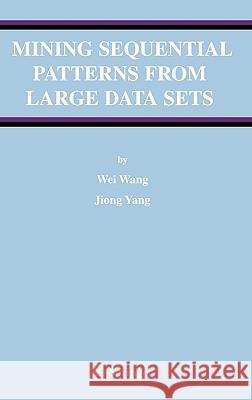Mining Sequential Patterns from Large Data Sets » książka
Mining Sequential Patterns from Large Data Sets
ISBN-13: 9780387242460 / Angielski / Twarda / 2005 / 163 str.
In many applications, e.g., bioinformatics, web access traces, system u- lization logs, etc., the data is naturally in the form of sequences. It has been of great interests to analyze the sequential data to find their inherent char- teristics. The sequential pattern is one of the most widely studied models to capture such characteristics. Examples of sequential patterns include but are not limited to protein sequence motifs and web page navigation traces. In this book, we focus on sequential pattern mining. To meet different needs of various applications, several models of sequential patterns have been proposed. We do not only study the mathematical definitions and application domains of these models, but also the algorithms on how to effectively and efficiently find these patterns. The objective of this book is to provide computer scientists and domain - perts such as life scientists with a set of tools in analyzing and understanding the nature of various sequences by: (1) identifying the specific model(s) of - quential patterns that are most suitable, and (2) providing an efficient algorithm for mining these patterns. Chapter 1 INTRODUCTION Data Mining is the process of extracting implicit knowledge and discovery of interesting characteristics and patterns that are not explicitly represented in the databases. The techniques can play an important role in understanding data and in capturing intrinsic relationships among data instances. Data mining has been an active research area in the past decade and has been proved to be very useful.











